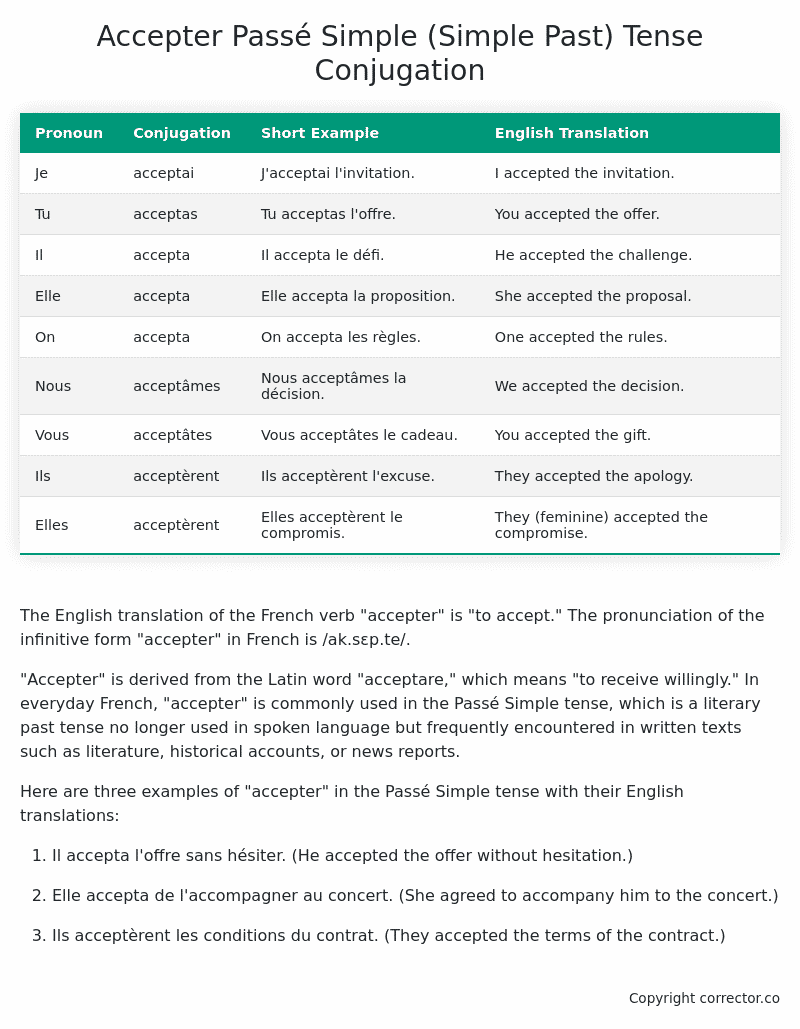Passé Simple (Simple Past) Tense Conjugation of the French Verb accepter
Introduction to the verb accepter
The English translation of the French verb “accepter” is “to accept.” The pronunciation of the infinitive form “accepter” in French is /ak.sɛp.te/.
“Accepter” is derived from the Latin word “acceptare,” which means “to receive willingly.” In everyday French, “accepter” is commonly used in the Passé Simple tense, which is a literary past tense no longer used in spoken language but frequently encountered in written texts such as literature, historical accounts, or news reports.
Here are three examples of “accepter” in the Passé Simple tense with their English translations:
-
Il accepta l’offre sans hésiter.
(He accepted the offer without hesitation.) -
Elle accepta de l’accompagner au concert.
(She agreed to accompany him to the concert.) -
Ils acceptèrent les conditions du contrat.
(They accepted the terms of the contract.)
Table of the Passé Simple (Simple Past) Tense Conjugation of accepter
| Pronoun | Conjugation | Short Example | English Translation |
|---|---|---|---|
| Je | acceptai | J’acceptai l’invitation. | I accepted the invitation. |
| Tu | acceptas | Tu acceptas l’offre. | You accepted the offer. |
| Il | accepta | Il accepta le défi. | He accepted the challenge. |
| Elle | accepta | Elle accepta la proposition. | She accepted the proposal. |
| On | accepta | On accepta les règles. | One accepted the rules. |
| Nous | acceptâmes | Nous acceptâmes la décision. | We accepted the decision. |
| Vous | acceptâtes | Vous acceptâtes le cadeau. | You accepted the gift. |
| Ils | acceptèrent | Ils acceptèrent l’excuse. | They accepted the apology. |
| Elles | acceptèrent | Elles acceptèrent le compromis. | They (feminine) accepted the compromise. |
Other Conjugations for Accepter.
Le Present (Present Tense) Conjugation of the French Verb accepter
Imparfait (Imperfect) Tense Conjugation of the French Verb accepter
Passé Simple (Simple Past) Tense Conjugation of the French Verb accepter (You’re reading it right now!)
Passé Composé (Present Perfect) Tense Conjugation of the French Verb accepter
Futur Simple (Simple Future) Tense Conjugation of the French Verb accepter
Futur Proche (Near Future) Tense Conjugation of the French Verb accepter
Plus-que-parfait (Pluperfect) Tense Conjugation of the French Verb accepter
Passé Antérieur (Past Anterior) Tense Conjugation of the French Verb accepter
Futur Antérieur (Future Anterior) Tense Conjugation of the French Verb accepter
Subjonctif Présent (Subjunctive Present) Tense Conjugation of the French Verb accepter
Subjonctif Passé (Subjunctive Past) Tense Conjugation of the French Verb accepter
Subjonctif Imparfait (Subjunctive Imperfect) Tense Conjugation of the French Verb accepter
Subjonctif Plus-que-parfait (Subjunctive Pluperfect) Tense Conjugation of the French Verb accepter
Conditionnel Présent (Conditional Present) Tense Conjugation of the French Verb accepter
Conditionnel Passé (Conditional Past) Tense Conjugation of the French Verb accepter
Conditionnel Passé II (Conditional Past II) Tense Conjugation of the French Verb accepter
L’impératif Présent (Imperative Present) Tense Conjugation of the French Verb accepter
L’impératif Passé (Imperative Past) Tense Conjugation of the French Verb accepter
L’infinitif Présent (Infinitive Present) Tense Conjugation of the French Verb accepter
L’infinitif Passé (Infinitive Past) Tense Conjugation of the French Verb accepter
Le Participe Présent (Present Participle) Tense Conjugation of the French Verb accepter
Le Participe Passé (Past Participle) Tense Conjugation of the French Verb accepter
Struggling with French verbs or the language in general? Why not use our free French Grammar Checker – no registration required!
Get a FREE Download Study Sheet of this Conjugation 🔥
Simply right click the image below, click “save image” and get your free reference for the accepter Passé Simple tense conjugation!

Accepter – About the French Passé Simple (Simple Past) Tense
Formation
Usage
Narration
Historical Context
Interactions with other tenses
Passé Composé
Imparfait
Conditional and Subjunctive
Summary
I hope you enjoyed this article on the verb accepter. Still in a learning mood? Check out another TOTALLY random French verb conjugation!


